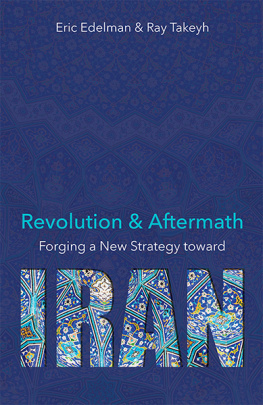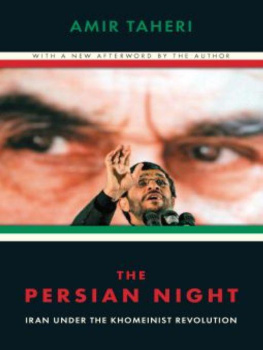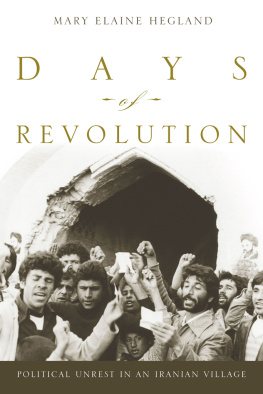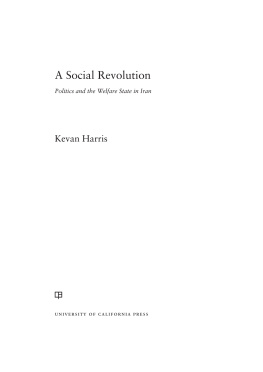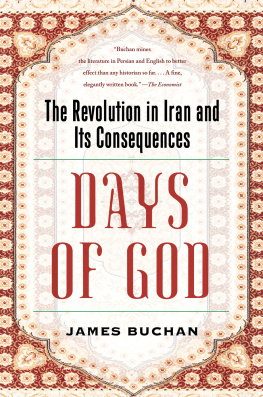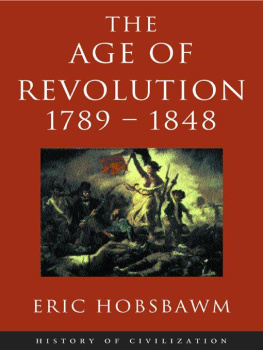Revolution & Aftermath
Forging a New Strategy toward
IRAN
The Hoover Institution gratefully acknowledges the following individuals and foundations for their significant support of the
HERBERT AND JANE DWIGHT WORKING GROUP ON ISLAMISM AND THE INTERNATIONAL ORDER:
Herbert and Jane Dwight
Donald and Joan Beall Beall Family Foundation
S.D. Bechtel, Jr. Foundation
Lynde and Harry Bradley Foundation
Stephen and Susan Brown
Lakeside Foundation
Nancy Doyle, M.D.

With its eminent scholars and world-renowned library and archives, the Hoover Institution seeks to improve the human condition by advancing ideas that promote economic opportunity and prosperity, while securing and safeguarding peace for America and all mankind. The views expressed in its publications are entirely those of the authors and do not necessarily reflect the views of the staff, officers, or Board of Overseers of the Hoover Institution.
www.hoover.org
Hoover Institution Press Publication No. 689
Hoover Institution at Leland Stanford Junior University,
Stanford, California 94305-6003
Copyright 2018 by the Board of Trustees of the Leland Stanford Junior University
All rights reserved. No part of this publication may be reproduced, stored in a retrieval system, or transmitted in any form or by any means, electronic, mechanical, photocopying, recording, or otherwise, without written permission of the publisher and copyright holders.
For permission to reuse material from Revolution and Aftermath: Forging a New Strategy toward Iran, by Eric Edelman and Ray Takeyh, ISBN 978-0-8179-2154-5, please access www.copyright.com or contact the Copyright Clearance Center, Inc. (CCC), 222 Rosewood Drive, Danvers, MA 01923, (978) 750-8400. CCC is a not-for-profit organization that provides licenses and registration for a variety of uses.
Hoover Institution Press assumes no responsibility for the persistence or accuracy of URLs for external or third-party Internet websites referred to in this publication, and does not guarantee that any content on such websites is, or will remain, accurate or appropriate.
Cataloging-in-Publication Data is available from the Library of Congress.
ISBN 978-0-8179-2154-5 (cloth : alk. paper)
ISBN 978-0-8179-2156-9 (EPUB)
ISBN 978-0-8179-2157-6 (Mobipocket)
ISBN 978-0-8179-2158-3 (PDF)
Eric Edelman dedicates this effort to the memories of Alexander and Milton Edelman.
Ray Takeyh dedicates this work to Alex and Nick.
CONTENTS
E RIC E DELMAN would like to thank his colleagues Tom Mahnken, Hal Brands, and Whitney Morgan McNamara for stimulating discussions on the role of Iran in US grand strategy past and present, and to Roger Hertog whose generous support over many years has permitted deeper study of US-Iranian relations than would otherwise have been possible.
R AY T AKEYH wishes to acknowledge Richard Haass and James Lindsay of the Council on Foreign Relations for providing him a great intellectual environment.
Both authors would like to thank Charles Hill and Russell Berman for suggesting that they take up this topic.
T HIS EXTENDED ESSAY IS THE WORK OF TWO AUTHORSONE primarily a former government practitioner with a background as a historian of American diplomatic history and the other a longtime student of Iran with recent government experience. They hope to illuminate a subject which has been surrounded by no shortage of heated polemics in recent years but which has generally lacked critical historical context. Iran is, and will likely remain, a major strategic challenge for the Trump administration and for US policy-makers more broadly over the next decade and beyond. Developing an approach to containing Irans hegemonic regional ambitions is an urgent requirement for the new national security team in Washington. However, unless senior US officials can disenthrall themselves from some of the persistent myths that have attended American-Iranian relations and grasp the lessons of almost forty years of confrontation with Irans revolutionary regime, it is unlikely that they will be able to successfully come to grips with the enormous challenge at hand.
Since the Iranian revolution and the subsequent hostage crisis, Americans have consistently seen the Islamic Republic as one of the United States leading international adversaries. Current polling puts Iran only slightly behind North Korea, whose young leaders brandishing of nuclear weapons has dominated the 24/7 American news cycle since President Trumps inauguration. Iranian leaders, for their part, continue to identify the United States as the Great Satan and the leader of international arrogance. They have employed a number of asymmetric tools to diminish US standing in the world and reduce Americas military presence in the region.
The profound disruption and dislocation occasioned by the Islamic Revolution set off historical forces that overturned the basic postulates of US post-World War II policy in the region, replacing secular radicalism with religiously based political movements as the driving ideological force in the Middle East and giving new prominence to sectarian divisions whose salience has only increased in recent years. Not all of the maladies that afflict the Near East are traceable to the events of 1979. But much of the extraordinary violence and mayhem that now seem to dominate this pivotal geopolitical space owe their origins to the overthrow of the shah and the installation of the Islamic Republic.
As this essay argues, Iran had played an underappreciated role in US grand strategy since the end of World War II. It had been a cause of the initial rupture between the United States and the Soviet Union, a battleground for influence between Russia and the West, a testing ground for various US policies in the Third World, and a key pillar of US security policy in the increasingly vital Gulf region. In the 1940s, the United States provided political support for countries resisting Soviet pressures; in the 1950s Iran became the Eisenhower administrations test case for the use of covert action; in the 1960s the Kennedy-Johnson administration tried out its theories of agrarian reform and modernization with the shahs White Revolution; and in the 1970s, the Nixon doctrines main beneficiary was Iran. The shock of the revolution, the seizure of US diplomats as hostages, and the emergence of Iranian-sponsored terrorist proxies in Lebanon was a disorienting experience for US policy-makers who had become accustomed to seeing the shah as an island of stability in a turbulent part of the globe. It was only natural, perhaps, that they would seek a return to something that looked like the status quo ante.
Beginning in the Carter administration, US policy-makers systematically misread the political dynamics inside Iran. They began the search for what former secretary of defense Robert Gates termed the elusive Iranian moderates who would polish the rough edges off the Iranian revolution and reengage with the United States on the basis of realpolitik considerations of Irans position vis--vis its Arab neighbors and the Soviet Union/Russia (with whom the country had long had an antagonistic relationship). There was a persistent failure to appreciate the uniqueness of Irans status as a revolutionary state committed to upending not just the regional distribution of power but the global correlation of forces as well.



